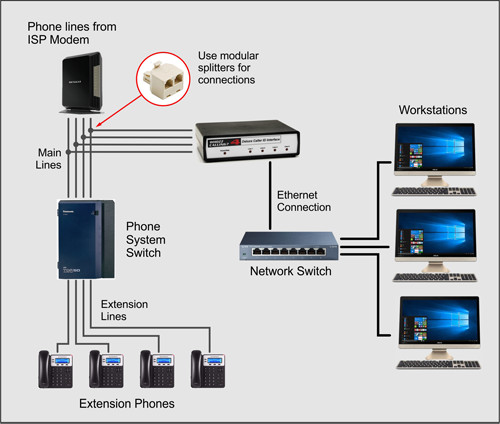Serial Port Whozz Calling? - No Telephone Switch

|
If you use simple, single line, 2-line, or 4 line phones, telephone line connections are made with the appropriate modular adaptors.
Whenever possible, we recommend that the unit is connected in parallel with phone lines. This allows simplified troubleshooting and
easy disconnection if the unit needs to be removed from the circuit.
The Whozz Calling? unit is normally located close to the computer that the serial cable is connected to.
Depending on your software requirements, the serial connection may be to your server, or possibly any
workstation. A straight DB9 M-F serial cable is included for a direct connection to a PC. Alternatively, a
"USB-to-Serial Port Adapter Cable" along with appropriate software drivers can be used.
|
Serial Port Whozz Calling? with Telephone Switch

|
The Whozz Calling? unit must be connected to the main incoming lines before they terminate into a telephone system switch.
In some cases, phone connections can be made using the appropriate modular adaptors. If you are not familiar with your
phone system wiring, contact a telephone technician specializing in internal building wiring. Whenever possible, we
recommend that the unit is connected in parallel with phone lines. This allows simplified troubleshooting and easy
disconnection if the unit needs to be removed from the circuit.
Depending on your software requirements, the serial connection may be to your server, or possibly any workstation.
A straight DB9 M-F serial cable is included for a direct connection to a PC. Alternatively, a "USB-to-Serial Port
Adapter Cable" along with appropriate software drivers can be used.
|
Ethernet Link Whozz Calling? - No Telephone Switch

|
If you use simple, single line, 2-line, or 4 line phones, telephone line connections are made with the appropriate
modular adaptors. Whenever possible, we recommend that the unit is connected in parallel with phone lines. This
allows simplified troubleshooting and easy disconnection if the unit needs to be removed from the circuit.
The Ethernet cable is connected to the same network switch or router that connects your workstations.
|
Ethernet Link Whozz Calling? with Telephone Switch

|
The Whozz Calling? unit must be connected to the main incoming lines before they terminate into a telephone system switch.
In some cases, phone connections can be made using the appropriate modular adaptors. If you are not familiar with your
phone system wiring, contact a telephone technician specializing in internal building wiring. Whenever possible, we
recommend that the unit is connected in parallel with phone lines. This allows simplified troubleshooting and easy
disconnection if the unit needs to be removed from the circuit.
The Ethernet cable is connected to the same network switch or router that connects your workstations.
|
Phones Connected to an Auxiliary Switch

|
When an auxiliary network switch is used for the phone connections, the Vertex monitors VoIP traffic between the two switches.
Connect the Main switch to the Auxiliary Switch through the Vertex "VoIP Bridge Ports". The Vertex Management port connects to
the network switch. Depending on your application software, the data output will be delivered by the Management Port Ethernet
connection or through the serial port.
|
Separate VoIP and Data Sub-Networks

|
This network architecture is seen with controlled POS systems that supply a separate router enabling all their equipment to
reside within its own subnet. Connect the Gateway Router to the Phone network switch through the Vertex "VoIP Bridge Ports".
If your application software accepts Caller ID via Ethernet, connect the Management port to the Data subnet as shown in the
diagram. If your application accepts Caller ID via serial port, the Management port can be instead, connected to the ISP
Modem/Router.
|
Phones and all other Equipment on one Network Switch

|
This configuration is not normally recommended since it slows the network speed to 100Mbps or less.
This may be a concern in data intensive environments. If the ISP Modem/Gateway Router and the network
switch does not auto-negotiate the 100Mbps speed, a manual speed setting will be required on either
the router or the switch.
|
|








